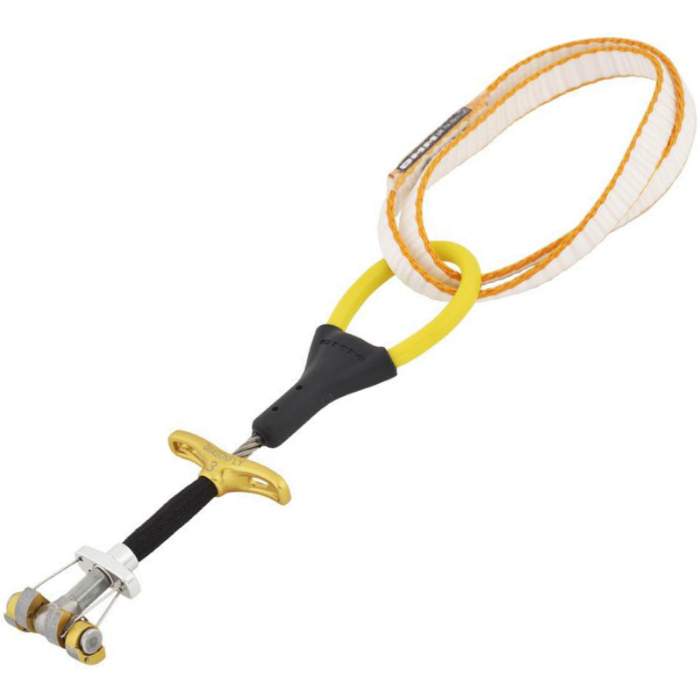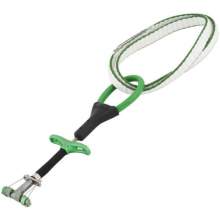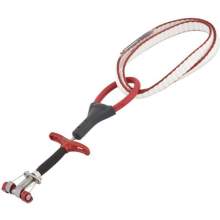How to use DMM Cam, warning, lifespan, inspection, care and maintenance with instructional pictures.
Dragonfly 3
Description
Dragonfly Micro Cams provide versatile protection for narrow cracks and pockets. The size 1 Dragonfly is the smallest certified climbing cam on the market. The six cams in the range cover placements from 7.8mm – 28.3mm.
The same camming angle of 13.75°, as used with our Dragons, provides the optimum balance of holding power and range. You will appreciate the holding power of the TripleGrip lobes with their ‘raw alu’ surface, particularly on smooth rock types such as slate and limestone. The narrow head width and compact trigger allow the cams to be placed deep in small pockets.
Retail price
When you click a link below and then checkout online, no matter what you buy (climbing gear or not), we get a small commission that helps us keep this site up-to-date. Thanks!
Weight (g / oz)  Weight (g / oz)In grams and ounces, the weight, as stated by the manufacturer/brand. | 65.0 g / 2.29 oz |
| Cam Head | 4 lobes, single axle |
| Offset | No offset |
| Stem | Flexible single stem |
| Sling | x11 mm Dyneema (double sling loop) |
| Camming Angle | 13.75° |
| Active Strength | 8 kN |
Cam Range (mm / in)  Cam Range (mm / in)In millimeters and inches, the maximum dimensions of the cam lobes when shut tight and fully extended. Since the "usable" range is so debatable, all manufacturers now list the full dimensions to avoid selling themselves short. For offset cams, we'll list the max dimensions possible and then afterwards list each of lobe dimensions. | 10.2 - 15.2 mm (0.40 - 0.59 in) |
| Materials | Main Material: Aluminium |
| Certification | EN |
No reviews yet.
All in all, The Dragonfly is a good unit, but I don't know if I would consider them superior to similar offerings from BD or Metolius (both of which are less expensive, MSRP). Now, if I found that 4 or 5kN wasn't enough to catch my falls, all of this would go out the window. But the 4kN of other tiny units I have climbed on has proven to be adequate for catching falls time and again; so the biggest advantage of the Dragonflies (6kN in the smallest size) feels like something of a moot point for me.
The DMM Dragonflies are our favorite small camming units due largely to their effective use of the old "Alien" design, and we have been very happy with their performance. While no small cam design is literally perfect (yet!), we think these are the most reliable and highest quality one that you can buy, with performance to match.
The Dragonflys are an excellent set of micro cams which cover all the placement sizes you could ask for and offer the benefits of a narrow headwidth, extremely flexible stem and extendable sling. The placement sizes also overlap nicely with the DMM Dragons, which is great if you're double-racking cams. My only criticism (and I'm digging deep here) is that the alloy on the lobes of the Dragonfly isn't quite as soft as it could be, and therefore might not bite as well. Overall, if you're looking for a set of micro cams to complete your rack then the Dragonfly is an excellent option. DMM's long-anticipated entry into the micro cam market was worth the wait!
The UIAA equipment standard provides a baseline for equipment performance in a test lab under controlled conditions on new equipment. Although these test conditions are relevant to the conditions encountered climbing, conditions encountered at the crags and the condition of the equipment are equally important. This recommendation from the UIAA member federation The British Mountaineering Council (BMC) provides vital equipment information that is NOT explicitly addressed in the standard, particularly failure modes of the equipment and recommendations for the use, inspection, maintenance, and retirement of equipment.
A pictoral representation of the UIAA-125 and EN-12276 standards for frictional anchors (which includes SLCD's [cams] and Ballnuts).











